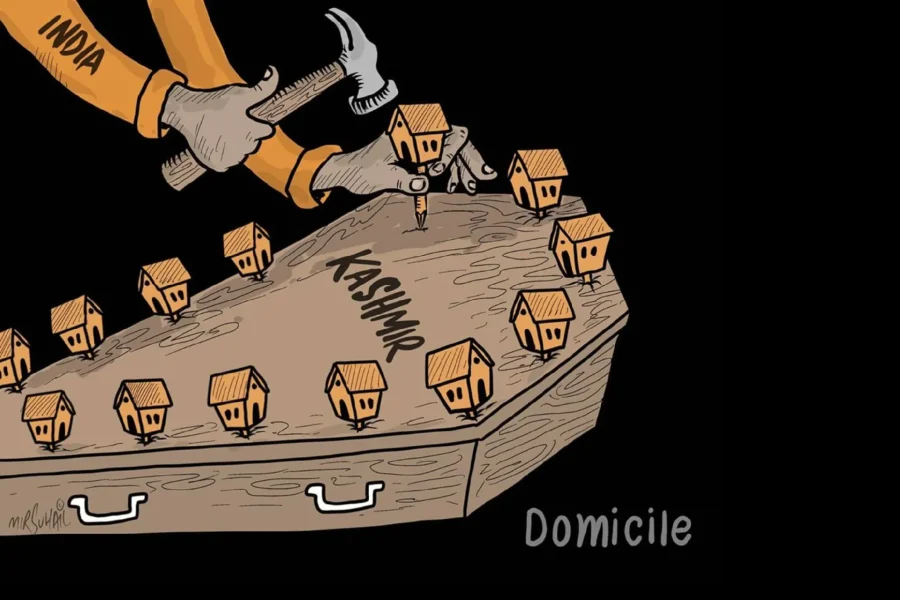Amara Malik
The people of Kashmir, who have been subjected to an oppressive military occupation by India since 1947, and Pakistanis observe October 27 as black day. In violation of the Indian Independence Act and the Partition Plan, which gave the people of the former princely states the right to self-determination, India moved soldiers into Jammu and Kashmir on this day. Subsequently, India has employed a range of tactics to strengthen its unlawful and illegitimate rule over Kashmir, including altering the region’s demographic makeup, stifling its political ambitions, infringing upon its human rights, and erasing its cultural and historical identity.
Despite UN resolutions, the right to self-determination has not been granted to the Kashmiri people. India has violently suppressed them, denied them fundamental freedoms, and violated their human rights. By allowing Hindus from outside to live in Kashmir, India has also made an effort to change the demographic and cultural composition of the territory.
The settler colonial project of India in Kashmir is not something new. The Rashtriya Swayamsevak Sangh (RSS) and the Bharatiya Janata Party (BJP), two Hindu nationalist groups that see Kashmir as a crucial component of their Hindutva ideology, have long harboured this desire. As discussed before, to accomplish their goal of colonising Kashmir, they have been employing a variety of strategies, including granting foreigners domicile certificates, taking land from the native population, destroying Muslim buildings and homes, putting restrictions on religious gatherings and activities, taking advantage of natural resources, and promoting Hindu culture and symbols. The purpose of these actions is to erase the history and identity of the indigenous people and to marginalize them.
Settler colonialism is a strategy by which a colony changes its demographic composition by introduc-ing settlers from the colonizing power or other regions. India has been doing this in Kashmir since 1947, particularly after it revoked Article 370 and Article 35A of its constitution in 2019, which granted some autonomy and protection to the state. This has allowed non-Kashmiri settlers to gain more rights and privileges, violating international law and UN resolutions.
India’s settler colonial project in Kashmir involves a systematic campaign of ethnic cleansing and genocide against the majority of the population, including nearly 100,000 deaths since 1989. The country has also imposed draconian laws, such as the Armed Forces Special Powers Act (AFSPA), which grant immunity to Indian forces’ personnel from accountability or prosecution for crimes against humanity. India has also used various methods to suppress peaceful protests and blind civilians.
Another aspect of settler colonialism is the denial of political rights and representation to the colonized people. In this regard, India has banned or co-opted any political party or leader advocating for self-determination or autonomy for Kashmir, arrested or assassinated prominent Kashmiri leaders, rigged elections, and dissolved or suspended any elected government or assembly that challenged its authority or demanded more rights. Adding to this, settler colonialism also involves the assimilation of cultural identity, as seen in India’s actions in Kashmir. They impose their language, religion, education, and culture on the Kashmiris, distorting their history and heritage through destruction or renaming of monuments and landmarks. India also attempts to undermine the art, literature, music, and cuisine of Kashmir by banning or censoring its expression or claiming it as its own.
American linguist, philosopher, and political activist Noam Chomsky has been a strong opponent of India’s Kashmir policy. He has drawn comparisons between the situation in Kashmir and Palestine, where an oppressive foreign authority drove out and subjugated the native population, as examples of settler colonialism. Both Israel’s annexation of Pal-estinian territory and India’s colonial settlement project in Kashmir are condemned for breaking international law and human rights. Both nations oppress and expropriate indigenous people using military might and political clout, but they encounter opposition from individuals who won’t give up the fight for liberty and justice. Also, Chomsky deemed it “unconscionable and hysterical” for the G20 to have any type of conference, much less a tourist gathering, and he attacked the 2023 G20 summit that took place in Indian-occupied Kashmir. In order to emphasize the severity of Indian rule of Kashmir and the persecution of Kashmiris, he has brought up India’s own tumultuous history under the British. Chomsky called for a peaceful resolution via discussion and diplomacy and has denounced India’s political repression of Kashmir.
He recommended a federal structure that would take into account the cultural variations induced by India in IIOJK. Chomsky agreed that Kashmiris should be able to choose their own destiny and endorsed their right to self-determination. He described Kashmir’s rich and varied culture as a unique and priceless entity, praising it. Chomsky also commended the Kashmiris for their tenacity and fight in preserving their identity in the face of adversity.
In addition to being a serious breach of international law, moral standards, and human rights, India’s settler colonialism in Kashmir poses a threat to the peace and stability of the whole region. It has resulted in several wars and conflicts between the nuclear-armed powers of Pakistan and India. In addition to supporting a peaceful settlement of the Kashmir issue, the international community has to act quickly to stop India from breaking UN resolutions and suppressing the rights of the Kashmiri people. Kashmir observes October 27 as “Black Day” to draw attention to the horrors and injustices meted out to the region and its people by Indian successive regimes.
Amara Malik is student of Peace and conflict studies at NDU and Intern at KIIR.










